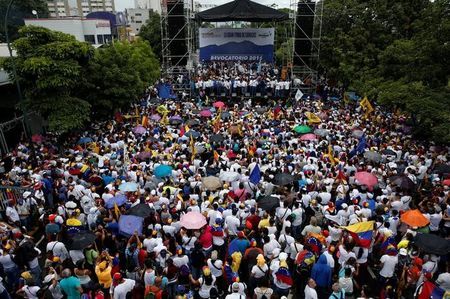by the El Reportero’s wire services
Thousands of Venezuelans gathered on the streets of Caracas on Sept. 2 to demand authorities permit a recall referendum against President Nicolás Maduro this year. The demonstration, dubbed “the taking of Caracas,” was the largest this year. Protesters filled up more than 10 miles of eastern Caracas, according to the Wall Street Journal. The Miami Herald said there were hundreds of thousands of protesters.
The buildup this week was tense: the government detained a few opposition leaders, accusing them of planning violence, and deported several international journalists planning to cover the protests.
Ahead of the protest, police set up roadblocks to enter the capital and interrogated people seeking to enter about their motives, reports the New York Times. The lines at the city’s main highway entrances stretched for miles, and several subway stations were closed, notes the WSJ. Caracas Chronicles has images of people entering the city on foot.
The image was one of a national strike, with shops and businesses closed to allow their employees to participate, according to the Miami Herald.
But citizens responded peacefully to the government’s hardball, reports Efecto Cocuyo. That in and of itself is important news, emphasized the opponent oriented Caracas Chronicles.
Opposition leaders promised to maintain an agenda of demonstrations in coming weeks.
More than 13,000 Hondurans Deported from the US
Tegucigalpa, Sep 2 (PL) More than 13,600 Honduran citizens were deported from the United States towards this Central American country from January until August this year, governmental organizations reported today governmental organisms.
According to a report of the Center of Attention to Returned Migrants the biggest number of returned migrants corresponds to the masculine sex, a total of 12,265.
Every year approximately 100,000 Hondurans tackle the migratory route towards the northern country, although a big part does not manage to arrive to this territory, said the organization.
Also Mexico, a country that from the year 2014 implements the program called South Border to prevent the increasing Central American migration, expelled thousands of Hondurans from its national territory.
Among the causes of the exodus in Honduras there are the absence of employment and economic and social opportunities, the extreme violence and the desire of familiar reunification, human rights organisms pointed out.
México reiterated that it won’t pay for the border wall
In the muddled aftermath of Republican presidential nominee Donald Trump to Mexico, the Mexican government reiterated that the country will not pay for the border wall that features prominently in the candidate’s campaign, reports Reuters. The visit was widely seen as a political defeat for President Enrique Peña Nieto, reports the Wall Street Journal.
Bolivia o strengthen controls over the country’s mining cooperatives
Bolivia’s government moved to strengthen controls over the country’s mining cooperatives after violent strikers last week beat a high-level government official to death, reports the Wall Street Journal. The presidential cabinet approved five emergency decrees regulating their operations, including forcing them to comply with labor regulations, including the right of workers to form unions, and report their annual earnings to authorities, reports the Wall Street Journal. The moves also outlaw the use of dynamite in protests, a common practice.



